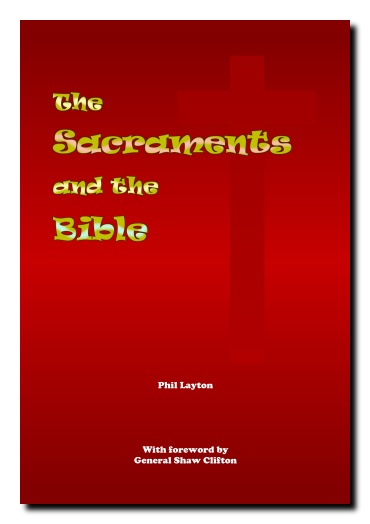Taking a fresh look at what Scripture actually says about the Sacraments
 only £2.99 Click here to buy now from Amazon  How can The Salvation Army justify non-adherence to
baptising them in the name of the Father and of the Son and of the Holy Spirit, Matthew 28 v19 |
The Sacraments and the Bible
The official review by Commissioner John Swinfen as published in Salvationist magazine, United Kingdom and Republic of Ireland Territory, July 29th 2007. 'A good, simple, Salvationist, sacramental roadmap.' IN this contribution to the ongoing
sacraments debate, Phil Deliberately separating out ‘traditions, schools of thought, teachings, customs, culture and practices’, his handling of Scripture is scholarly, direct, healthy and constructive, comparing Scripture with Scripture in its context, and looking for the essential meaning behind specific incidents and teachings in balance with the text as a whole. He aims at a concise approach to the subject and achieves this in a well-used 51 pages. Without clutter, he brings the reader to the issues free of mindsets and special pleading, to look objectively at essential Scripture. His style and organisation are helpful, engaging the reader. He strongly affirms baptism. Making it clear that the essential meaning of baptism is strengthened by detaching it from water, he finally defines it as a confession of faith. There is, of course, more to say about the spiritual immersion that the concept of baptism symbolises, and he would no doubt go into this in a larger book. On the Eucharist, without denying our fellow Christians a ‘means of grace’ which they find helpful, he gives a restatement of the essential way God channels his grace and mediates his love and sacrifice in Jesus to daily life and the real human condition. While not specifically demonstrating the Incarnation as the overarching sacrament – linking the spiritual and the physical – he gives a good, simple roadmap for the Salvationist’s journey to a true understanding of sacrament, not as ceremony but as interaction with God in Jesus by the Holy Spirit. Phil handles the Last Supper authentically
in terms of the Passover meal for the Jew, allowing the reader to extend this
thought into Jesus’ teaching about salvation in the sense that the full
replaces the partial; the universal and individual replaces the national; We return to a great central truth. The all-embracing essential sacrament is the Incarnation: God present in our total environment in Jesus, communing with us through a vast number of media by the Holy Spirit; confirming and implementing the divine character, values and spirit in power and love to every truly receptive human mind and heart. Phil Layton gives us a very useful manual which sets out the basic issues simply across the spectrum of Christian thought and practice; a little book to join the treasury of the Army’s little books, classically modelled on John Coutts’s This We Believe series. |
Click here to return the to main page and book rationale
